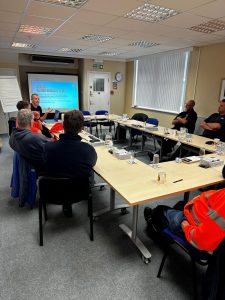Teams in Severn Trent Services have been putting their health and well-being first with help from Paul Bannister, founder of ManHealth – an organisation supporting men through difficulties in their mental and physical ill health, ultimately to prevent suicide
.

Since September, small groups of male employees have gathered for workshops to discuss topics some might perceive as having a stigma attached to them. For example, mental health and physical diseases prevalent among men.
Mike Killingbeck, Regional Service Delivery Manager North, instigated the sessions. He said: “Last year, our teams pulled out all the stops, taking on extra work while we filled vacancies. So, I felt they were due something back.”
The workshops have been focussed on two things. Firstly, the signs and symptoms of the five biggest killers in men: heart attack, stroke, lung cancer, bowel cancer, and suicide. Secondly, a mental health check-in.
Men play a big part
Severn Trent Services operates in a traditionally male-dominated industry, although that picture is changing.
Dan Mcardle, Head of Water Services Contracts, said:
“We manage water and wastewater assets, and in my corner of the organisation, those jobs are predominantly operational – which in the past have attracted more male applicants.
“So, with a largely male workforce to care for, we teamed up with ManHealth to facilitate conversations about health and wellbeing and to remind our people what help is available whenever they feel they need it.”
The sessions are delivered in small groups to create a safe space for people to speak up and discuss what’s on their minds. Managed by experienced facilitators, they encourage peer support and story sharing.
Dan added: “The workshops are helping us to learn more about each other. Whether that’s health concerns we’ve had or obstacles we’ve had to overcome in the past that make us who we are today.
“I’ve got loads of respect for my team members who are brave enough to express their feelings and emotions in front of their workmates.
“Hard as it might be for some, I know these sessions are making a difference because the guys who’ve been on them have proactively rang up and told me.”
Establishing peer group support
The workshops have enabled employees to check in with one another, and this peer group support continues as a business-as-usual activity.
Mike explained:
“The sessions have birthed our version of a mental health peer support group.
“We’ve met three times and covered several topics, including cost of living, January blues, and combating stress.”
Ryan is a Regional Service Delivery Manager for the East of England. He said:
“I’ve heard some deeply personal stories and issues that our people face at home.
“This activity has created a great support network to better understand what people look like on their good and bad days and what might affect them. But most importantly, people know we’re here to have a chat if they need us.”
Mike summarised: “My aim when I set out was to avoid mental health becoming a tick box exercise by making it into a far more involving and personal experience for the employee. There’s a long way to go, but we’ve made real progress within five months, and we’re committed to the journey, however long it takes.”
For more information about ManHealth, please visit the website here.








